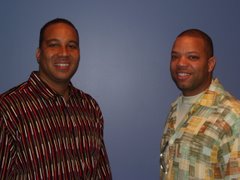Judging (scrutiny or distinguishing right from wrong) Vs. Passing Judgment (condemning and issuing a penalty or sentence)
(Author thought: This article has been inspired by some events that I have encountered over the past several years. It appears as though there are some people who don’t know that there is a difference between judging (distinguishing between right and wrong) and passing judgment (sentencing people for a crime). For years, I have been telling people about the Gospel, on the political campaign trail, and trying to educate people on other issues. In that time, I have encountered some people who have accused me of judging them and saying that I’m not their boss. My intentions have never been to be anyone's "boss," to harm, to damage or to belittle anyone. I probably did hurt some people's feeling with my delivery or choice of words in the past, but that was not my heartfelt intention. Sometimes, youth, unbridled zeal, and growth can be out of control if not harnessed properly; so if anyone reading this article has been offended by my verbal delivery, I apologize if it wasn’t done in love.
I eventually learned to not address the person per se, but the underlying force influencing him/her (i.e. belief system, habit, addiction, etc.). But actually, this type of accusation [“You’re judging!”] is generally an old psychology defense mechanism trick to play on people’s emotions and turn the situation in their favor. It is also an attempt to make the person, who being accused as “the judge,” feel guilty. Well, the root of these types of mind games is the “enemy,” because the Spirit of God won’t despise the truth. So we have to remember with whom we are ultimately dealing. But some people are sensitive, and some are even extra sensitive when discussing certain issues, so now I know to have a genuine heart when dealing with people on specific topics. I tend to get very passionate about topics that are dear top me, and we all must remember that everyone may not see things as we do. However, the Word of God is still true, whether you are in America, Japan, or if your head is buried in the sand. Plugging up your ears and shouting LA-LA-LA-LA-LA-LA-LA-LA-LA as loud as you can doesn’t negate the Word of God. I have been dealing with the general public about issues such as: politics and religion for over 10 years, and it doesn’t matter in what part of the country I am, people seem to always have a sensitive spot that they don’t want touched [a sacred cow]. Well I am writing this article to set the record straight, and to encourage people to stop using these “cop out” excuses for why they are involved in a sin, wrongdoing, habit or addiction, or why they have a Non-Biblical viewpoint on the issue[s]. Let’s remove our blinders, prejudices, and assumptions so that we can move forward, get on one accord and we can all be successful.)
The age old “stop judging,” "you are too judgmental" and “you can’t judge me” cries are very popular defense mechanisms that are employed when one’s actions, motives or thoughts are called into question. Is judging wrong? Should we or should we not pass judgment on people? What does the Bible have to say? That’s all that we are interested here at B.G. Street: the Bible is our reference point; it is our benchmark so to speak. So whatever it says in context, and in line with other Bible references is to what we must adhere. It is my Biblical and contextual contention that judging (scrutinizing and distinguishing right from wrong) is not wrong. I have studied the issue thoroughly and have drawn a very sound and reasonable conclusion. After reading this article, it will therefore be your job to search the Scriptures to see if my points are valid and sound doctrine. So let’s go to class, students. OK? Let’s go!
The Law was given from God through Moses to the Children of Israel so that they and we could distinguish between: right and wrong; good and evil; God’s ways and the enemy’s ways. Today, naturally-speaking, we have laws and statutes (i.e. speed limit signs) that tell us what is right or wrong. If the sign says 55 and we are going 60, then the sign is an indicator that we are doing wrong. Law (God’s way) is a good thing! Remember that! It brings order to society. But laws aren’t vocal, they are written, so when we are told that we did or are doing wrong then it is a warning or a punishment for the wrongdoing. Warning people, speaking out against a wrongdoing, and defending what is right are basically answering in the affirmative the Bible question: Am I my brother’s keeper (Genesis 4:9)? That’s what the Great Commission is all about: sounding the alarm, being a watchman on the wall, being a weathervane or a beacon. When a person states that homosexuality is wrong; is it wrong to say that? No! The Bible states that. But this doesn’t mean that the person is bad or condemned to Hell. People can change and be delivered, but that is God’s job to deliver. Our job is to be available vessels to minister compassion and the truth of Scripture in love. But three things must seriously be taken into account when judging/scrutinizing a situation:
· What is the motive of the heart when we judge (scrutinize)?
· How do we vocalize our judgment (scrutiny)? Is it offensive?
· Are you attacking the person or the act?
If you attack the act that a person is committing, then your defense can be that naturally-speaking this practice is harmful and spiritually-speaking this practice alienates you from God (Isaiah 59:1-2). We shouldn’t be so fearful of people or their feelings that we are afraid to address issues; nor on the other hand should we be so sensitive that we miss a helpful warning or correction. If we all just do things with a genuine and pure heart, on the giving and receiving end, I am certain that we can be more effective.
What happens many times in these situations is that Person A will see Person B involved with a sin, wrongdoing, wrong belief, addiction or habit. Person A may say what Person B is doing is wrong. Person B might be offended because Person B may or may not think it’s wrong to do. Person B might also believe that it is wrong to do, but may feel that it isn’t Person A’s place to tell Person B that. Well this scenario is very common and we should always be very prayerful and cautious when dealing with people and their “sacred cows,” so to speak. We have to remember that there are over 7 billion people with many personalities with which to deal. We have to always remember a few things when dealing with people (Christian or not) who are struggling with a sin, wrongdoing, wrong belief, addiction or habit.
*God is not mad at anyone who is sinning and He loves us all (Romans 5:8).
*God is more concerned about that person’s salvation/deliverance than we are. God sacrificed His Son for that person. We gave up nothing on this person’s behalf. So God definitely has a vested interest in the person. (John 3:16)
*God can reach anyone on their level in a way that they can receive God’s message and He never condones the sin (Isaiah 59:1-2)
*God has a plan for everyone’s life (Jeremiah 29:11)
*God just wants us to be an available vessel through which He can work (2 Corinthians 4:7)
*God is able to prick people’s hearts (Acts 2:37)
*God can break up the fallow ground of people’s hearts (Hosea 10:12)
*God can reveal the truth to people (Ephesians 1:17)
*God can open the eyes of their understanding (Ephesians 1:18)
*God can cause them to come to repentance (2 Peter 3:9)
We should never assume that anyone is beyond God’s saving grace and delivering power. Look at Saul of Tarsus, who later became the Apostle Paul. If a man who prided himself on killing Christians can be redeemed and do great things for God, then any of us can. Nobody is perfect and not everyone has the same zeal and passion for God. We all blossom and bloom differently and things that excite one person about God may not excite the next person. Let’s remember to deal with people as Jesus said in Matthew 10:16, “be ye therefore wise as serpents, and harmless as doves.” Notwithstanding, those of us who need to be instructed on matters that maybe sensitive, should always keep in mind the parable of the sower (Matthew 13). All of the seeds that were sown were good, but only 25% of them brought forth fruit. Jesus said that the seeds that brought forth fruit did so 100-fold, 60-fold and 30-fold. In other words, how you open yourself to receive the word of God, cultivate the seed, and let it germinate in you will determine the yield of that seed: 100-fold, 60-fold or 30-fold. Be open to receive from the word of God! Even if the person doesn’t use the most effective delivery method, ask God if there are insights, wisdom, concepts or ideas that you can glean from what was spoken. Always try to take the high road and look for the best in the situation. If the person was totally off in what he/she said to you, then shake the dust off of your feet and keep walking in faith.
Here are a few Bible texts for us to consider for this topic:
*Matthew 7:1-6 “Judge not, that you be not judged. For with what judgment you judge, you will be judged; and with the measure you use, it will be measured back to you. And why do you look at the speck in your brother’s eye, but do not consider the plank in your own eye? Or how can you say to your brother, ‘Let me remove the speck from your eye’; and look, a plank is in your own eye? Hypocrite! First remove the plank from your own eye, and then you will see clearly to remove the speck from your brother’s eye. “Do not give what is holy to the dogs; nor cast your pearls before swine, lest they trample them under their feet, and turn and tear you in pieces.
(Author’s thought: Jesus is talking about passing judgment and condemning people. We have no right to do this, because none of us are perfect, nor has God commissioned us to be judges. Only the standard of the Word of God can judge us (John 12:48). This is different than having a genuine heart of compassion to help, to encourage or to correct someone. Remember, if they don’t have the heart to receive from you, then don’t cast your pearls before swine [Matthew 7:6])
*1 Corinthians 2:14-16 But the natural (unsaved) man receiveth not the things of the Spirit of God: for they are foolishness unto him: neither can he know them, because they are spiritually discerned. But he that is spiritual judgeth (scrutinizes) all things, yet he himself is judged of no man. For who hath known the mind of the Lord, that he may instruct him? But we have the mind of Christ.
(Author’s thought: the Apostle Paul is talking about spiritual people having the ability and the insight to discern matters spiritually. When a person is living/walking in the Spirit [Galatians 5:25] he/she is above any ridicule or earthly judgment because he/she is walking in the fruits that the Spirit of God is manifesting through them, and “against which there is no law” [Galatians 5:22-23]. Who can judge the Word? No one. So as we walkin it, we are free from judgment.)
*1 Thessalonians 5:21 But test and prove all things [until you can recognize] what is good; [to that] hold fast.
(Author’s thought: this is quite simply instructing us to discern the motives, reasoning, attitudes, origins, etc. of everything that we encounter. We are not to take anything for granted. If you have a genuine heart to known the truth, or if you need wisdom or insight on a matter, ask God [James 1:5])
*John 20:21-23 Then Jesus said to them again, Peace to you! [Just] as the Father has sent Me forth, so I am sending you. And having said this, He breathed on them and said to them, Receive the Holy Spirit! [Now having received the Holy Spirit, and being led and directed by Him] if you forgive the sins of anyone, they are forgiven; if you retain the sins of anyone, they are retained.
(Author’s thought: I can imagine people asking the disciples in a nasty tone, “who gave you the right to say whether I’m saved or not, my relationship with the Lord is between Him and me, and I don’t have to explain anything to you?” Well what most people don’t realize is that if you don’t do things for God by His Word, then you are out of order. A person is not saved just because he/she says they are saved, or because they go to church or because they have a dusty family Bible in the living room. A person gets saved because, according to the Word, they accept and confess Jesus Christ [Romans 10:9-10, 13]. Jesus giving the disciples this authority to confirm or refute salvation makes perfect sense. There were no Bibles at the time, Jesus was the Word/God manifested in the flesh [1 Timothy 3:16], and delegating this authority allowed the message to get out to more people quicker. )
*John 7:24 Judge not according to the appearance, but judge righteous judgment.
(Author’s thought: This is another example of Jesus teaching us about discernment and distinguishing good from bad, and truth from error.)
None of these Scriptures gave authority to any person to judge, to condemn or to sentence anyone for any reason. Again, this is different from discerning a situation and/or distinguishing right from wrong in a situation. Even if a person is doing wrong, we can’t sentence them. We can only tell them the truth, invite them to accept the Word and pray. Only God can deal with people’s heart.
(Author’s thought: Because of judging (passing judgment), some people are ashamed to be themselves in front of certain people. Some people are afraid that some people will think that they are weak or inadequate (for a lack of a better term, they are insecure). But people aren’t afraid to be weak, broken or inadequate before God, because they know that God will still accept them and help them. We need to be like God and treat people likewise.)
QUOTES
Be knowledgeable and pass along sound information. A library without readers is a useless building.
Let people (in their personalities) be themselves, and don’t try to twist them into your own image. If you change them to look like you, then it’s the reflection of you that you like in them, not the uniqueness of them.






















No comments:
Post a Comment